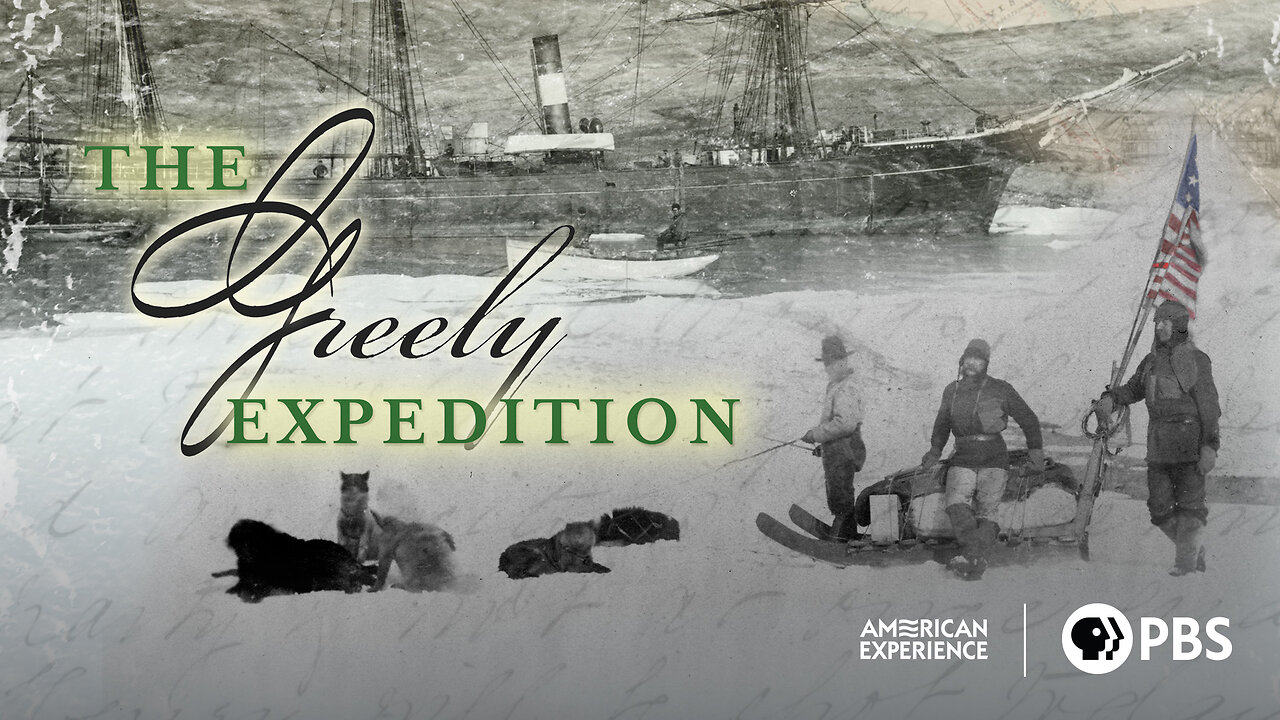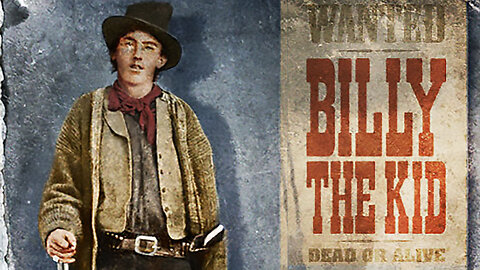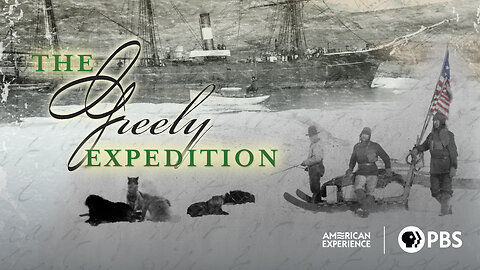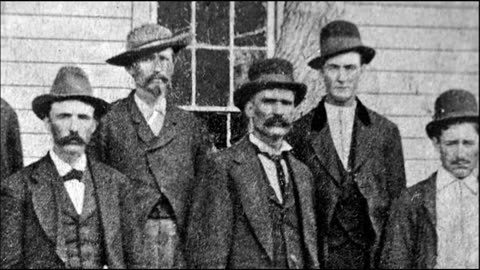Premium Only Content

PBS American Experience: The Gilded Age
PBS American Experience: Panama Canal
PBS American Experience: Butch Cassidy and the Sundance Kid
PBS American Experience: Billy the Kid
PBS American Experience: Alexander Hamilton
PBS American Experience: The Nuremberg Trials
PBS American Experience: Ruthless: Monopoly's Secret History
PBS American Experience: The Greely Expedition
PBS American Experience: Henry Ford
PBS American Experience: Edison
PBS American Experience: Mount Rushmore
PBS American Experience: The Rise and Fall of Penn Station
PBS American Experience: Jesse James
PBS American Experience: Riveted - The History of Jeans
PBS American Experience: Silicon Valley
PBS American Experience: The Big Burn
PBS American Experience: The Greely Expedition
On August 1, 1884, a rescue vessel pulled into the harbor of Portsmouth, New Hampshire carrying First Lieutenant Adolphus Greely and the five other remaining survivors of the Lady Franklin Bay Expedition. Three years earlier, 25 men had set sail for the far North, where they planned to collect a wealth of scientific data about the Arctic — a vast area of the world's surface that had been described as a "sheer blank." Greely and his men completed that task, only to be abandoned in one of the harshest environments on Earth. The Greely Expedition reveals how poor planning, personality clashes, questionable decisions and pure bad luck conspired to turn a noble scientific mission into a human tragedy.
Adolphus Greely joined the United States Army in 1861. After fighting for the Union in the American Civil War, Greely became involved in the campaign to build a nationwide telegraph system for the Signal Corps. There, he learned about technology and weather systems. In the 1870s, Greely developed an interest in the Arctic region; he also heard of a potential exploratory mission to the far North. The purpose of the expedition was to collect scientific data as part of the first International Polar Year, the effort to gather concurrent geophysical measurements at various sites around the Arctic region. "This was not simply some new Arctic expedition. This is really an attempt at a new science of the world," says historian Michael Frederick Robinson in the film.
The Lady Franklin Bay Expedition, however, had another motive: the United States wanted to beat the longstanding "Farthest North" record claimed by the British for decades. Greely, with no prior experience or knowledge of Arctic weather and condition, was given command of the mission, which launched in the summer of 1881.
Five weeks after departing from St. John's, Newfoundland aboard the U.S.S. Proteus, Greely and his team reached Ellesmere Island in the Arctic Circle and prepared for their unprecedented mission. Left there with 350 tons of supplies, the team went to work building an outpost they christened Fort Conger, which would serve as their home for the coming two years. They recorded daily measurements of the weather and prepared for the springtime attempt at reaching "Farthest North." By summer, a relief ship would pick them up and bring them home.
But in the summer of 1882, the relief ship did not come. The expedition team had brought supplies to last three years at Fort Conger, but the men were wary and facing the grim reality of another year in the far North. The dark, Arctic winter was tough on many members of the team. It took only a few people to do the scientific work, and several men were left idle. "At the beginning most of the men did the scientific work because they were told to do it," says Robinson. "But as the men begin to contemplate that they may not return home, then suddenly leaving behind some kind of legacy for all this pain and suffering becomes more important." Greely's militaristic style kept order in place but left some questioning his leadership capabilities.
When in 1883 the relief ship failed once again to show up at Fort Conger, Greely ordered his men to abandon their post and sail three small boats over 250 miles of open ocean to the south where the Army had planned to leave a rescue party. If the Army's ship could not reach Lady Franklin Bay, the plan was for Greely's team to go to the Army; there, at least, they would find food, reinforcements, and possibly even news from home. The men, however, were hesitant to leave the relative safety of Fort Conger. Morale reached a new low among Greely's team, and there was talk of mutiny.
After a harrowing trip, Greely and his men arrived at Cape Sabine to find only a few weeks' worth of provisions. "No game, no food, and apparently no hopes from Littleton Island," Greely wrote in his journal. "We have been lured here to our destruction. We are 24 starved men; we have done all we can to help ourselves, and shall ever struggle on, but it drives me almost insane to face the future. It is not the end that affrights anyone, but the road to be traveled to reach that goal. To die is easy; very easy; it is only hard to strive, to endure, to live."
With only a makeshift shelter and virtually no animals to be found in the desolate region, men began to die one by one of hunger and exposure to the elements. They endured frostbite and natural amputation, madness, and even cannibalism. By the time a final relief force arrived the following summer, in 1884, only seven emaciated, unrecognizable men remained inside a half-collapsed tent.
Although his team had earned the extraordinary title of "Farthest North," and amassed a vast collection of valuable scientific observations, Greely became mired in scandal upon his return to the U.S. Published in the press, gruesome accounts of cannibalism and murder tainted Greely's reputation as a commander as well as the team's scientific achievements for more than a century. More recently, however, Greely's Arctic data has been revisited and the numbers have contributed to scientists' understanding of this relatively unknown area of the world. "We are now using [Greely's] data to understand how global warming happens," says Robinson, "to understand how the climate has changed over the last hundred years."
-
 59:39
59:39
Flyover Conservatives
22 hours agoLeft for Dead: The Dark Secrets Behind Clinical Trials Exposed - Brianne Dressen, React19 | FOC Show
30.1K -
 5:28:19
5:28:19
Wahzdee
9 hours agoAm I Too Old to Keep Up? New Game? 🤔🎮 - Warzone/Kompete Days! S1E13
49K4 -
 1:08:07
1:08:07
Josh Pate's College Football Show
4 hours ago $1.80 earnedNational Title Prediction | Clemson’s Big Moves | CFB’s Golden Age | USC Childhood Hatred
29.2K -
 1:00:57
1:00:57
The StoneZONE with Roger Stone
3 hours agoShould Trump Pardon Corrupt Mayor Eric Adams? | The StoneZONE w/ Roger Stone
24.6K8 -
 4:09:51
4:09:51
SwitzerlandPlayIT
6 hours ago🔴 LIVE - RANDOM GAMING - Kingdom of Amalur?
42.8K2 -
 31:50
31:50
Standpoint with Gabe Groisman
1 day agoEp. 64. Canada: the 51st State?!
37.5K9 -
 57:28
57:28
Sarah Westall
5 hours agoCabal Loses Control, Crackdown Back Fires & Day of Reckoning Coming w/ Sam Anthony
63.4K11 -
 1:10:22
1:10:22
Edge of Wonder
5 hours agoDreams & Laser Experiments Prove the Matrix Code Is Real
29K3 -
 1:18:05
1:18:05
Redacted News
8 hours agoBREAKING! BIDEN'S MASSIVE MIDDLE FINGER TO AMERICANS, TRUMP AND PUTIN PLAN PEACE TALKS | Redacted
121K237 -
 2:00:11
2:00:11
vivafrei
8 hours agoHegsetnh Confirmation Hearings Recap; Jack Smith Report Recap! La Fires Recap & MORE!
118K78















